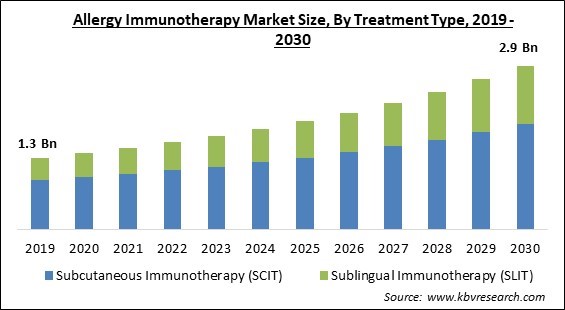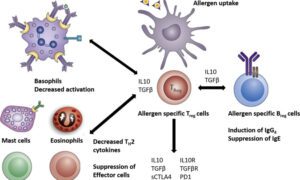Future Market Insights (FMI) predicts that between 2020 and 2030, the worldwide allergy immunotherapy market will grow at a healthy rate. According to the estimate, by the end of 2030, the market will be worth US$ 2,892.2 million.
The rising prevalence of allergies such as allergic rhinitis, allergic asthma, food allergies, skin allergies, and other types of allergies is driving up the need for efficient therapies. As patients seek innovative treatments to build allergy resistance and live a life free of discomfort, allergy immunotherapy has emerged as a viable medical option. Future Market Insights (FMI) predicts that between 2020 and 2030, the worldwide allergy immunotherapy market will grow at a healthy rate. According to the report, the market will be valued at US$ 2,892.2 Mn by the end of 2030
Furthermore, allergic rhinitis is one of the most common allergens, affecting 10% to 30% of the world’s population. When a person is exposed to allergens – usually dust mites and pollen – it causes inflammation in the nose, swelling in the eyes, and sneezing, among other symptoms even though
Even though a significant section of the population does not seek medical help, greater awareness of the treatments available, combined with increased healthcare spending, is projected to be a key demand-side trend over the forecast period.
Key players:
- ALK Abello
- Stallergenes Greer
- Allergy Therapeutics
- Aimmune Therapeutics
- Energies
- Arrayit Corporation
- Biomay AG
- HAL Allergy Group
- DVB Technologies
The projected growth in the allergy immunotherapy market is also being influenced by advancements in technology and research. Innovative treatment methods, such as sublingual immunotherapy and more personalized approaches to treatment, are gaining traction. These methods offer patients greater convenience and comfort, as they can be administered at home rather than requiring regular visits to a clinic. Such developments are likely to encourage more individuals to consider immunotherapy as a viable option for managing their allergies.
Additionally, the rise of biologics—targeted therapies derived from living organisms—is reshaping the landscape of allergy treatment. These biologics can provide tailored solutions for patients who have not responded well to traditional therapies. With ongoing research into the efficacy and safety of these new treatment modalities, we expect to see an expansion in the types of allergies that can be effectively managed through immunotherapy.
Regulatory support is another crucial factor contributing to market growth. Governments and health organizations worldwide are increasingly recognizing the importance of allergy treatment, leading to more favorable regulations and reimbursement policies. This support can help lower the barriers for patients seeking treatment, making it more accessible and encouraging higher adoption rates.
Moreover, the increasing focus on preventative healthcare is driving demand for immunotherapy. As individuals become more proactive about their health, they are more likely to explore options that not only treat symptoms but also address the root causes of allergies. This shift in mindset is expected to lead to a greater emphasis on long-term solutions, like immunotherapy, which can provide enduring relief.
In summary, the allergy immunotherapy market is poised for significant growth through 2030, driven by a combination of increasing allergy prevalence, technological advancements, supportive regulations, and a shift towards preventative care. As awareness of these treatment options expands, more patients are likely to seek out allergy immunotherapy, reinforcing its role as a cornerstone in allergy management.































